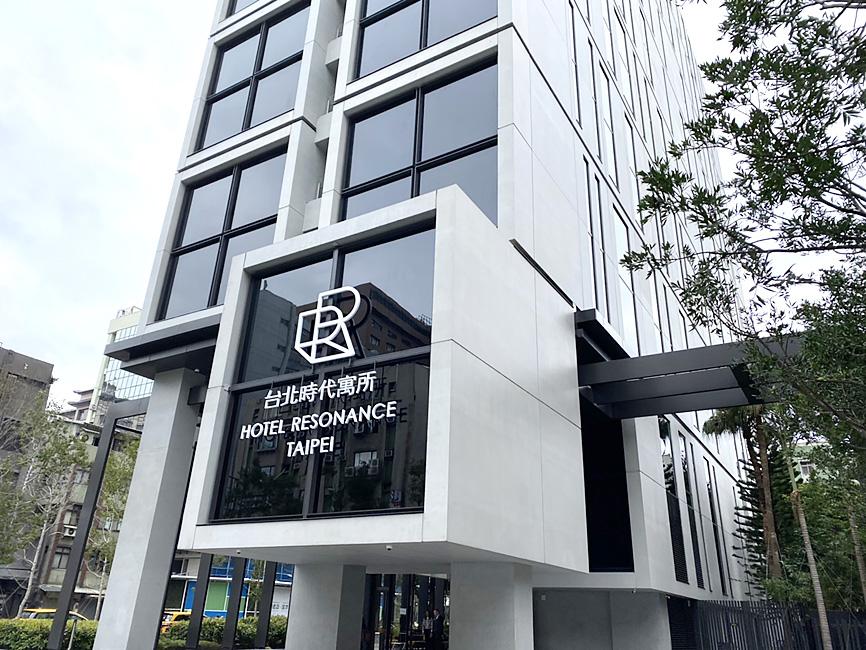US hotel operator Hilton Worldwide Holdings is next month to launch its third property in the nation, Hotel Resonance Taipei (台北時代寓所), despite the COVID-19 pandemic that has diminished international travel.
Hotel Resonance Taipei is a joint venture between Tapestry Collection by Hilton and Tainan-based Prince Housing and Development Corp (太子建設) to cater to technology-savvy business and leisure travelers.
Located on Taipei’s Linsen S Road near the MRT Shandao Temple Station, the hotel — which features 175 guestrooms, a Starbucks cafe, a wellness spa and other amenities — is available for reservations from NT$3,360 (US$116.62) per night ahead of its opening.

Photo: CNA
The property sits on a 1,091 ping (3,607m2) lot, the superficies rights of which Fubon Life Insurance Co (富邦人壽) won for NT$2.61 billion in April 2013 and later leased it to Prince Housing and Development.
Hotel Resonance Taipei is Prince Housing and Development’s second lodging facility after W Hotel in Taipei’s prime Xinyi District (信義).
It is the first hotel under the Tapestry brand in the Asia-Pacific region, reflecting confidence on the part of the US hotelier about the region’s tourism market.
Hotel executives declined to speculate on occupancy and room rates for the first year after the opening, but said they hoped that independent tourists would account for 90 percent of its customers after the world emerges from the COVID-19 pandemic.
The convenient location, just one stop from the Taipei Main Station, Michelin-star restaurants and popular tourist attractions, would lend support to its business, hotel executives said.

NEW IDENTITY: Known for its software, India has expanded into hardware, with its semiconductor industry growing from US$38bn in 2023 to US$45bn to US$50bn India on Saturday inaugurated its first semiconductor assembly and test facility, a milestone in the government’s push to reduce dependence on foreign chipmakers and stake a claim in a sector dominated by China. Indian Prime Minister Narendra Modi opened US firm Micron Technology Inc’s semiconductor assembly, test and packaging unit in his home state of Gujarat, hailing the “dawn of a new era” for India’s technology ambitions. “When young Indians look back in the future, they will see this decade as the turning point in our tech future,” Modi told the event, which was broadcast on his YouTube channel. The plant would convert

‘SEISMIC SHIFT’: The researcher forecast there would be about 1.1 billion mobile shipments this year, down from 1.26 billion the prior year and erasing years of gains The global smartphone market is expected to contract 12.9 percent this year due to the unprecedented memorychip shortage, marking “a crisis like no other,” researcher International Data Corp (IDC) said. The new forecast, a dramatic revision down from earlier estimates, gives the latest accounting of the ongoing memory crunch that is affecting every corner of the electronics industry. The demand for advanced memory to power artificial intelligence (AI) tasks has drained global supply until well into next year and jeopardizes the business model of many smartphone makers. IDC forecast about 1.1 billion mobile shipments this year, down from 1.26 billion the prior

People stand in a Pokemon store in Tokyo on Thursday. One of the world highest-grossing franchises is celebrated its 30th anniversary yesterday.

Zimbabwe’s ban on raw lithium exports is forcing Chinese miners to rethink their strategy, speeding up plans to process the metal locally instead of shipping it to China’s vast rechargeable battery industry. The country is Africa’s largest lithium producer and has one of the world’s largest reserves, according to the US Geological Survey (USGS). Zimbabwe already banned the export of lithium ore in 2022 and last year announced it would halt exports of lithium concentrates from January next year. However, on Wednesday it imposed the ban with immediate effect, leaving unclear what the lithium mining sector would do in the